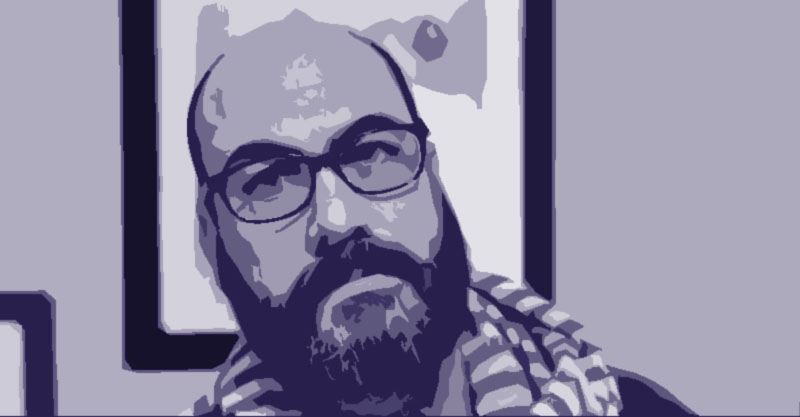
You, devoted I-94 Bar reader, may have noticed a review I did a few weeks back, for the album by New York-raised, now Ireland-domiciled multi-instrumentalist and vocalist, Eric Mingus, called "Fog of Forgiveness". One of Eric's collaborators, Catherine Sikora, sent it to me out of the blue, and when I had a chance to listen, I was rather blown away.
Eric Mingus came to my attention several years ago, when a musical interpretation of "Tommy” (the Who double LP) played in Adelaide for the Festival Fringe, at the magnificent Her Majesty's Theatre (now being rebuilt). I thought that, since I wanted to ask Eric about a ton of stuff, I asked Catherine if I could do an e-mail interview with Eric. He doesn't seem to do that many interviews - possibly because of the nature of interviewers.
His dad Charles was a mighty jazz legend (if you know who I mean, then read on; if not, get Googling); however, if you have your own, distinct musical drive, people will always compare the first with the second. (Recall that Sir Winston Churchill named his son Winston Spencer-Churchill - imagine going to school with that millstone of a name ...) Eric Mingus is a very different kettle of fish to his dad, and what he does is ... well, it is to some extent beyond music to my mind.
Rather than a series of straight Q&As, I had more of an email conversation with Eric, so if the preambles seem a little involved ... well, sod you. I'm writing this for your entertainment. Either be entertained, or don't be. There are a lot of musical springboards (ie, links in here. You're far too conservative in your musical tastes). Get corrupted and follow the links. Lastly, Eric writes in American English, and yes, he has spelled his words correctly.
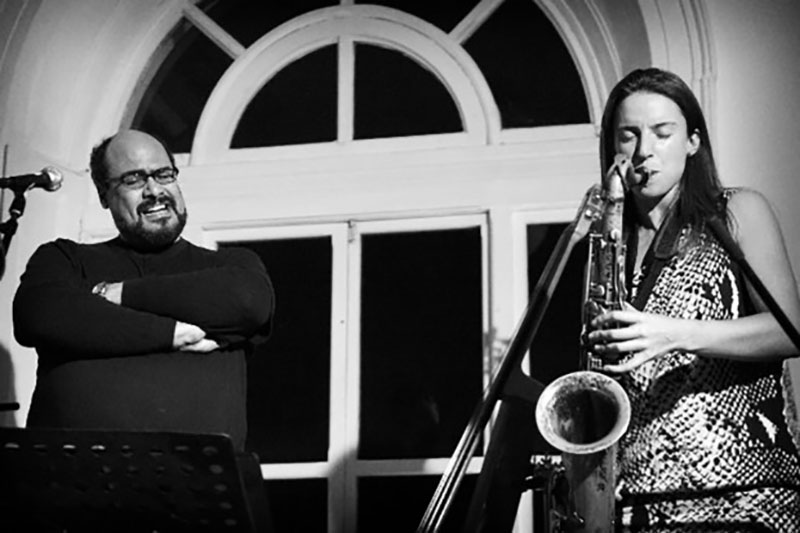 Eric on-stage with Catherine Sikora. .
Eric on-stage with Catherine Sikora. .
Could explain what drew you to "Tommy" in the first place? And what on earth made you want to put it on as a stage show? I suppose the shows in Adelaide weren't recorded..?
Eric Mingus: It was a joke at first. It was 20 years or so ago, I was working with my good friend Jim McCaul, a New York artist. We worked together renovating apartments all over NYC. Ah, the joys of the construction site radio! At some point we were joking around and started singing rock tunes with an operatic style. Probably not as funny as we thought it was. But we were hot and miserable and really fucking dirty. Then the tune "Fiddle About" popped into my head and I started singing it like an old, past-his-prime lounge singer. You know the type, disconnected from the words, a little shy of drunk. It was twisted and dark and funny-into-not-funny. But planted the seed.
The Who's 'Tommy” is a fascinating album. The music is sparse and open, but so full of expression. Very focused. The story, on the album is very minimal. It just tells you who sings the song next to the written lyrics. It is very minimal and very open to interpretation.
The album isn't the story that is in the movie "Tommy".
Album: 1920's post-World War I;
Movie: World War II into 1970's-ish.
I never saw the musical. Doesn't interest me. But I am sure, it ain't the album!
The “Tommy” in most folks' minds is distorted by the film. We had an issue with this with our production. One of the performers accused me of cutting the original songs. It was very confusing, I was sure we had every song. Turned out, the performer was listening to the movie soundtrack. They didn't know about the original Who album. I find every time I go back to listening to that original "Tommy", I notice something I didn’t before. It’s also a predominately mild and acoustic album. The energy is like a slow burn in a way. Very unlike the live performances The Who did of "Tommy". I think it’s an anniversary year and The Who are doing some shows. Entwistle shines on it, he plays all the horns and wrote "Cousin Kevin" and "Fiddle About" - and not to mention that bass!
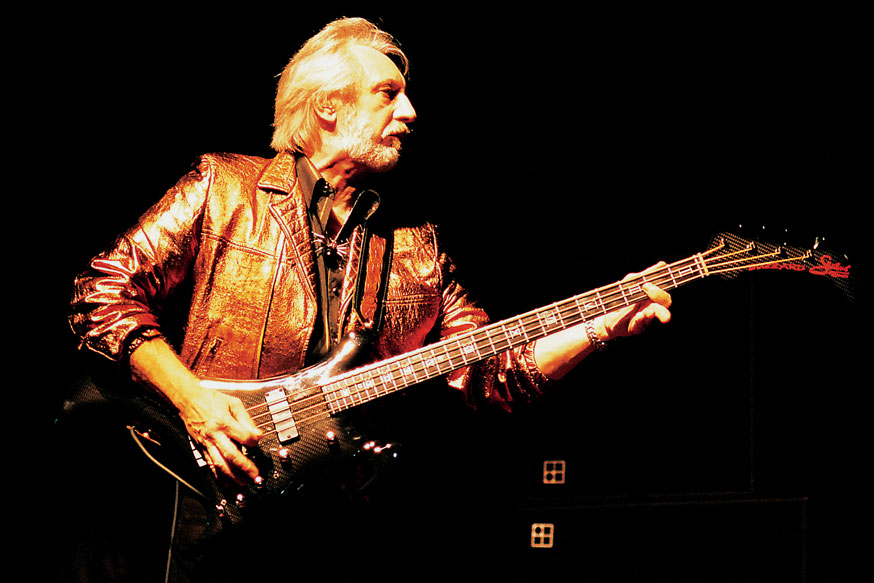 The late John Entwistle of The Who.
The late John Entwistle of The Who.
The “Tommy” shows in Adelaide ... looking back, it's a mixed bag for me. I am very proud of the work we did. But my original concept wasn't really achieved. I find listening to the recordings frustrating. No-one's fault but my own. A lesson to me in compromise and vision. I find my original demos catch the vibe I was after more accurately. It’s difficult to dissect the show in Adelaide, everyone really worked hard to make it happen and as I said I am proud of the result and it was a wonderful experience. Absolutely loved that band! But having the show in Adelaide had an effect on the cast and musicians we could choose. Plus things like the length of time we were there, and people's availability.
So we ended up with a mix of musicians and cast which was some local, some imported. When I made the demos, I had particular singers and musicians in mind. When we finally had our cast and musicians, many things had to be changed in order to accommodate their styles, skills range, etc. Some folks were not comfortable with the arrangements we had, and new one were written for them; that suited them, but not the show. I felt anyway. It was collaborative as well. Hal Willner and Gavin Friday had their input too. So I had to balance my choices with their advice.
We (the crew that did the show) are looking for an opportunity to present "Tommy" again. Gavin Friday and I have discussed a smaller more intimate night club version of it. I think that would be cool. I am also working on putting together the the musicians I had in mind when I first wrote the arrangements and making a recording of it. Most likely singing it all myself like I did on the demos."
(Gavin Friday, former lead singer with Irish outfit Virgin Prunes, is a singer, actor and performer. )
I gather you started on cello, then electric and upright bass, and I know you play other instruments; I expect the bass will always be a primordial thing for you, but what other instruments have really thrilled you?
Eric Mingus: I look at instruments as tools. Music and woodworking for me evolved in parallel. The jobs determine the tools I need. So I use the tools I need to create what I am looking for.
There were instruments that were always around our house when I was growing up. As a kid I would pick one up and try to make music. I wouldn't give up until I had made a tune on it. there was a piano, guitars, a banjo, trumpet, trombone, recorders, a bamboo flute, drums and on and on. I love instruments, to figure out how they are made, the understanding of how they make the sound they make. I enjoy exploring them for sounds they weren't designed to make too! Also enjoy working on instruments, doing repairs or alterations.
Just about any instrument interests me. I really love pianos. Such an amazing combination of wood and metal. All different shapes and so many different sounds. I can sit at a piano for hours.
Bass has come back full swing for me. In my early years I did more sessions and was in a few bands in NYC. Then transitioned into only playing bass on my own projects, basically singing and playing at the same time, and that can alter the approach to both disciplines. After that sometimes I would record a bass track or two for a friends' project or play for Hal Willner on one of his multi-artists shows. Recently I started gigging out again and have been really enjoying it. I even got myself a bass with frets on it! Hadn’t had one for years. It’s been fun exploring the bass on its own without singing my own tunes along with it. Even getting back to playing standards once in a while has be fun. I can give the bass my full attention and I am enjoying it quite a bit.
Ah, you're one of those musicians. 'What can this thing do?' is one of my favourite examples of adults allowing themselves to be transported back to being a curious child. A few friends of mine (a few names: Chris, Adam, Kingsley) are a bit like that; visiting them is a bit like entering a mysterious cave or the scientist's laboratory. One particular friend (Adam) enjoys taking the specs from any given pedal or two, tweaking the specs himself and creating a hybrid monster ... Eric, bearing in mind that you like to extract every drop of possibility from an instrument in order to utilise the tool where appropriate - where do you stand with pedals? Do you use them? Can you customise them? Do you have a preferred company?
Eric Mingus: I have done some basic rewiring and modifications to amps and guitars, but am not major electronics wiz. I have built and repaired wood instruments. Mostly as I needed to to keep things going. I have yet to tinker with an effects pedal. I have some specs for a few, but haven’t done any yet.
It’s kind of timing with some questions. I haven’t used pedals live. My electric upright has a great sound on it’s own and I never found effects I like putting it through. When I record, most of the time I don’t even use an amp. It has a great preamp in it. Sometimes a bit of compression and a bit of EQ if the tune calls for it. But that’s on the track, not in the signal chain.
With guitar, I really enjoy going right into the amp and bringing out the different sounds that combination can give. I had the honor of touring with Hubert Sumlin with Elliott Sharp’s Terraplane (and did several gigs with Hubert as his singer). Watching and hearing him play was an education in sound in fingers. It didn’t matter what guitar he played. He got his sound out of it. One time a young girl about 10 or so I guess, came backstage to meet Hubert and have him sign her "Hello Kitty" guitar. Not only did he sign it, but he plugged it in and played a tune for her. I was blown away at how good it sounded and how he got his sound on on that thing.
[I-94 Bar: If you're not sure who Sumlin is, I am sure you're heard him. "Hubert Sumlin’s sizzling guitar playing energized many of the classic Chicago blues records of Howlin’ Wolf in the 1950s and ‘60s. His reputation in blues and rock circles propelled him to a celebrated career on his own after Wolf’s death in 1976."
If you're not sure who Sharp is, this is from his website: "Sharp is an American multi-instrumentalist, composer, and performer. A central figure in the avant-garde and experimental music scene in New York City for over 30 years, Elliott Sharp has released over eighty-five recordings ranging from orchestral music to blues, jazz, noise, no wave rock, and techno music. He leads the projects Carbon and Orchestra Carbon, Tectonics, and Terraplane and has pioneered ways of applying fractal geometry, chaos theory, and genetic metaphors to musical composition and interaction. His collaborators have included Radio-Sinfonie Frankfurt; pop singer Debbie Harry; Ensemble Modern; Qawwali singer Nusrat Fateh Ali Khan; Kronos String Quartet; Ensemble Resonanz; cello innovator Frances Marie Uitti; blues legends Hubert Sumlin and Pops Staples; pipa virtuoso Min-Xiao Feng; jazz greats Jack deJohnette, Oliver Lake, and Sonny Sharrock; multimedia artists Christian Marclay and Pierre Huyghe; and Bachir Attar, leader of the Master Musicians Of Jajouka."]
Eric Mingus: It’s not that I don’t like pedals, I own a few and use them when I am recording tunes I am working through and just generally play around with them, Sometimes they spark ideas. But live, I sometimes find them awkward to use with all that I have going on when I perform. Touring, it’s just adding one more bag to lug around. So I have done without. But as I said, timing. As I mentioned I recently picked up a fretted Jaguar bass and have that Brecht show coming and I wanted to have lots of sonic options. So I am at this moment putting together my effects chain, as that bass really lends itself to effects and I needed a way to switch between basses and not compromise the sound of either, so need a few things to make that happen, so why not throw some effects in there too.
I guess the thing that bothers me most about effects pedals, is that they are on the floor and if you need to tweak something during a tune, you got to get down there and if you put them on a table you got to pull your hands away from the instrument and poke at and turn things. I have seen musicians get completely lost in trying to tweak a knob mid tune and have trouble coming back from it! Some I have seen be smooth as anything and it’s cool to watch. Knox Chandler is amazing with all his effects and apps. I called him for advice. We will see how it goes for me!
[I-94 Bar: Knox is a session guitarist and cellist; he's worked around a lot - with Budgie, for example, and has a thing coming up with Eric called 'Bursting Blue Bark'.]
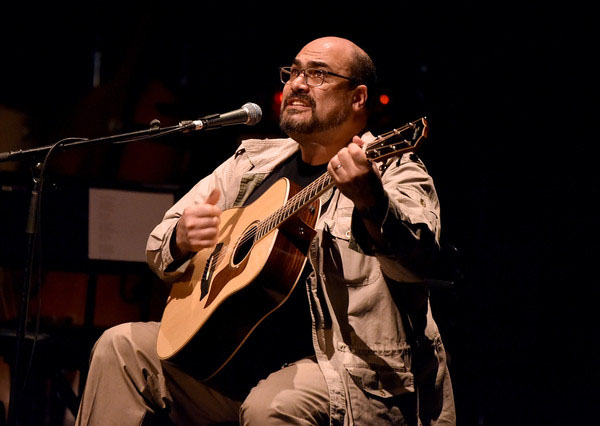
Eric, how on earth did you develop your voice? That's really quite an engine!
Eric Mingus: The voice is my favorite instrument. I work with it constantly and listen intently to other voices around me and try and learn from them. Not just recorded, intended to be heard voices, but the sounds our voices make every day, sometimes without thought. The song in words spoken. The melodies of the words we speak everyday.
I often try to recreate the sounds I hear around me. Not just vocal sounds but the sounds around us. From car horns to bird song, to the sounds of a construction site. Sounds that intrigue me when I hear them.
A major influence on my singing is Paul Robeson. I was fascinated by him when I was a child. Such a powerful presence and a stunning voice. Can’t express the joy I felt as a boy when my voice dropped and I could hit them bass notes! It was hearing him that made me want to sing.
The foundation of my voice is based on the education I received from classical and choral singing that started in school when I was a kid. But it all really comes down to controlling your air and being aware of what your body is doing whilst you are singing. Also learning what can be damaging to your voice and finding ways to grow and maintain one's vocal abilities. It is something that constantly evolves and changes as we age.
I love exploring spaces with the sound of the voice. The spaces can carry, diminish or even distort the voice. I am working on an art/sound installation project that will, in a way turn a room into an acoustic effects pedal and depending on where you are in the room, the sound will change.
As you can hear on "Fog of Forgiveness", I also explore the voice in the digital space, using effects and manipulation. I try to leave a little bit of an organic vibe in the end result by using the effect while I am recording the voice rather than doing it after.
I-94 Bar: Last night I was watching a Scorcese documentary on Muddy Waters and “Electric Mud” with a friend of mine, John (born and raised in Harlem). He mentioned that music doesn't recognise colour. I'd add that it doesn't recognise sex neither. We humans are good at constructing boundaries. John and I used to go for walks along the seafront. He'd be first to greet all the (predominantly white) folks out walking. See the slight anxiety in their eyes as he approaches (he's 6 foot 4 inches and big), alleviate it cheerfully, naturally. Quite extraordinary. I always say, "by their actions shall ye know them" - doesn't matter what class or background someone has. It's how they behave. So - does expectation have an impact on your music, or your broader life? If so, what forms does it take, and how on earth do you deal with it?
Eric Mingus: I agree, music doesn’t recognize color or gender ... But for sure us assholes who make it, play it, sell it, listen to it and everything else certainly do. The shit my dad got for having musicians that were white and sometimes women in his bands was really puzzling to him. They use to call them 'Salt and Pepper' bands. If you could play, you could stay. If you couldn’t hang musically, get the fuck out and hanging musically wasn’t about technique (though it helped). It was about really expressing your own true musical voice. With my own career it was difficult to work through what folks expected me to look like and sound like. To some I didn’t look or sound "black", to others I was not "White" enough to suit what they expected. No way I could meet all those expectations and who the fuck would want to! In fact splitting me into two is just silly, there's way more to my blood line and life than that. I suppose that answers your question. The legacy I try to follow is not what is expected by others. But what I expect from myself, what my father expected from his musicians in way. To constantly search and explore the art for my true voice. To challenge myself, to step outside of what is common and to deal with the everyday shit that crosses our paths and to keep keeping on.
Behaviour, race, class is a tricky one. In the US often times a black man’s passion can be mistaken for anger. It has lead to some awful consequences. I completely understand John alleviating the anxiety of the white folks, but it’s a drag that he has to do it at all. I was raised to avoid conflict with white folks and police growing up. I always had to be polite and respectful. I am still for the most part wired that way. But there’s an underlying fear that is at the core of that, the punishment for stepping outside of what is expected from society. My white friends growing up could lash out at society and for the most part got away with it, or go to a special school for their behavior. But us non-white kids, risked a lot more with the same behavior. Some of us were badly beaten, went to jail for a long time for what those other kids got a slap on the wrist for. Sadly even some kids were killed. See that shit too often still. But as Martin Luther King began to speak on before he was murdered, it’s more about poverty than race. If we focused on what really divides our societies, some real change would come."
I-94 Bar: [I didn't actually have a question here. We were talking about whether Eric needed to see a copy of this interview before I submitted it. Given there's not a lot of information on Eric out there in interweb land despite his success, I did wonder why, but did not actually ask.]
Eric Mingus: I am fine without reading it. I want it to be from your point of view dealing from the words we exchanged. So really it’s up to you. I’ll read it, but more than likely wouldn’t have you change anything. I really don’t have a clue as to what is out there on me. When I first started most of my success was in Europe. France, Italy, etc. So I wasn’t able to read most of it. Though I did learn to read: “The son of Charles Mingus” in every language!
Most of the stuff I could read was quite inaccurate or just insulting, so I don’t bother to read it often. I also had a couple of interviews go wrong. But I saw that with my dad. So much garbage is out there about him; to be fair, he put a lot of it out there himself. I once sat with him when he had a bunch of interviews scheduled and he gave every writer a different answer! There was a bit of truth in each answer, but for sure, he enjoyed playing with it.
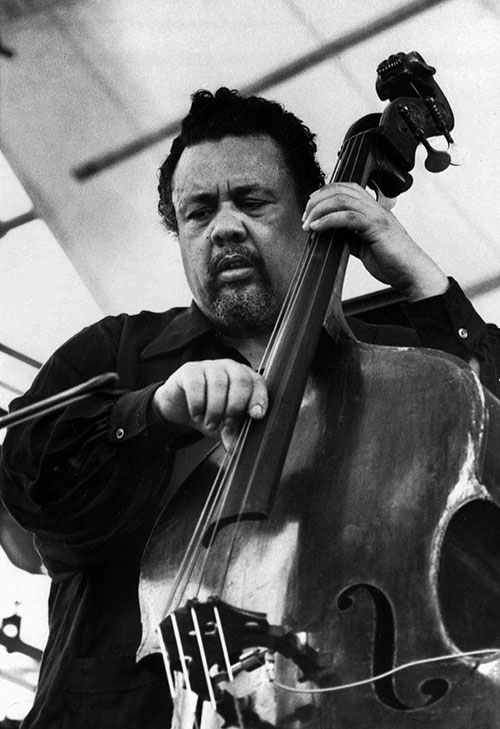 Charles Mingus in 1974.
Charles Mingus in 1974.
I think when he wrote “Beneath the Underdog”, and the editor and publishers weren’t interested in his thoughts on music composition and theory and essentially wanted jazz stories, he was really hurt and decided, 'fuck it'. He really wanted the book to be more about the music. That was one of the last things he told me. He wasn’t happy with that book and later Britt Woodman, the great trombonist and childhood friend of my dad’s said, that he, my dad and a few other friends sat around and made up stories for the book because it looked like it wasn’t going to get published if there weren’t stories of outlandish behavior. But they put in the stories and cut the part about music. Fucking shame.
Well, that took a turn!
Whatever you want. I am happy to answer more. End it here. Read it or not.

